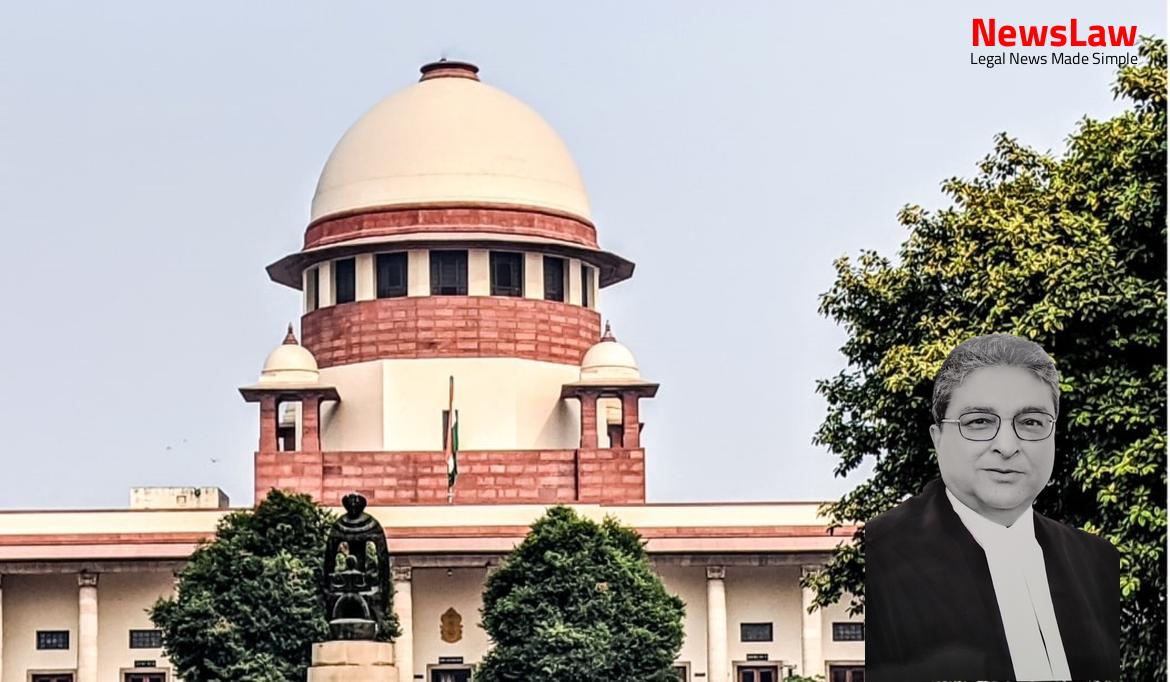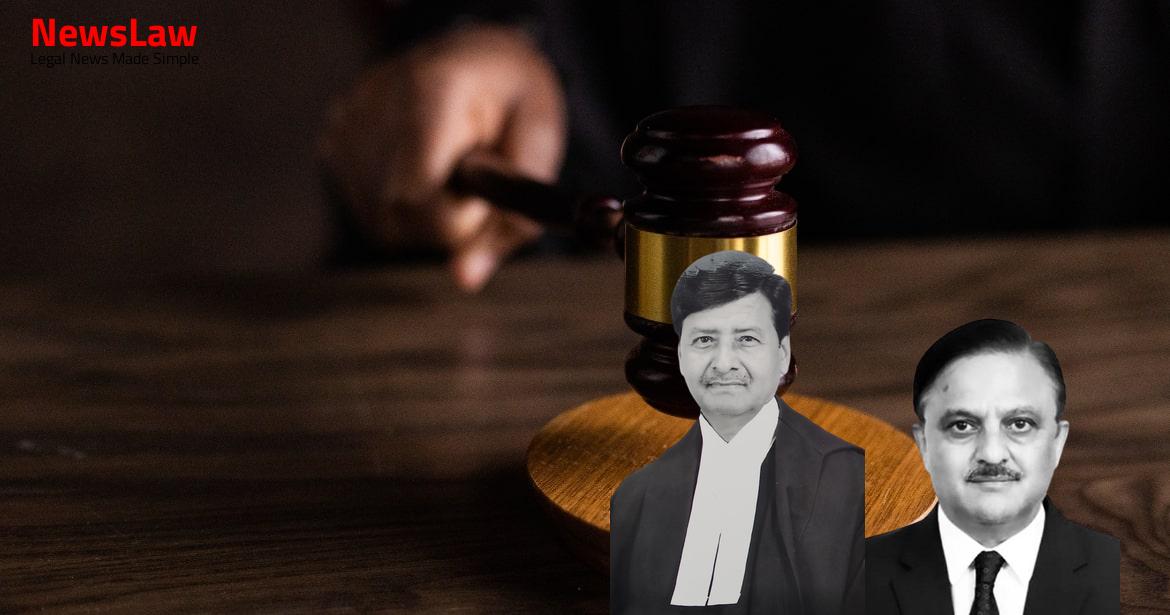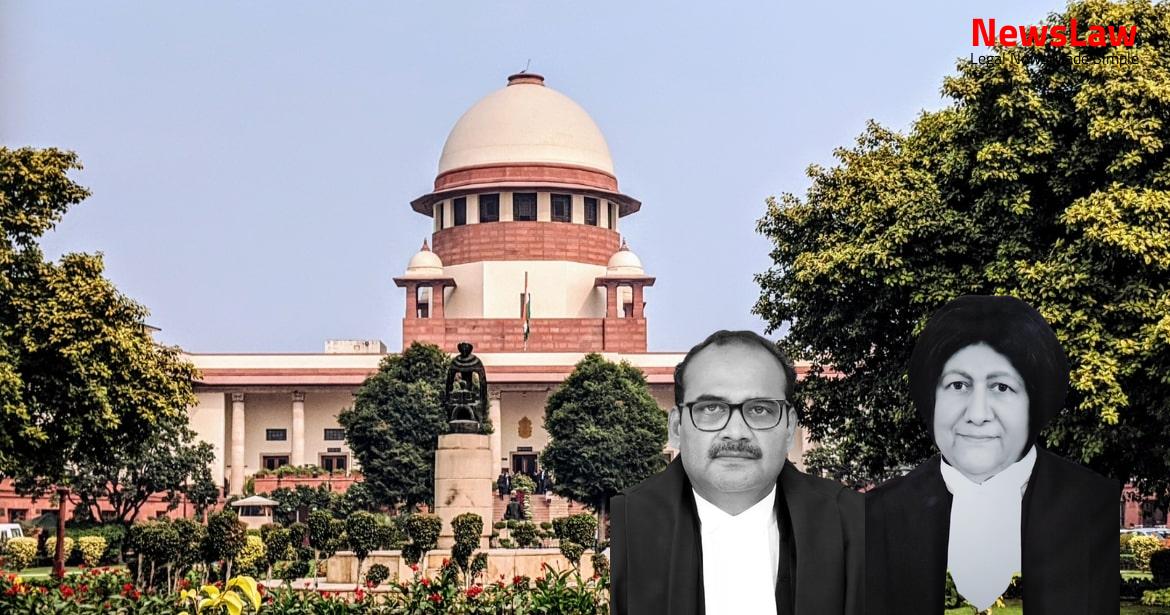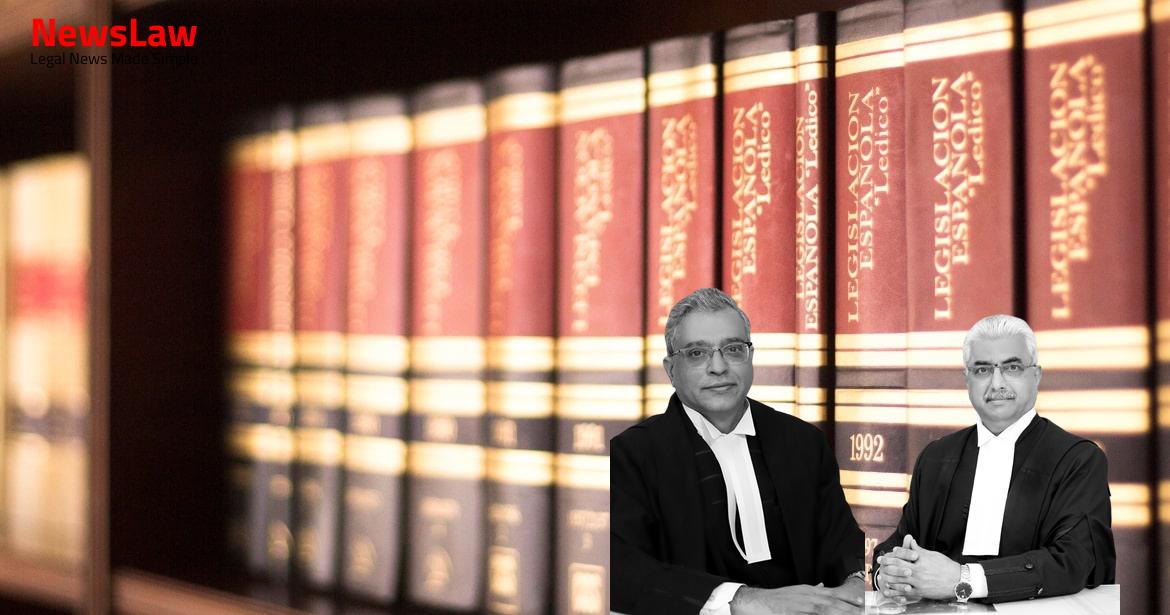In a recent landmark judgment by the Supreme Court, a decree was passed regarding the Urs family property dispute. The case involves the division of shares between the plaintiffs and defendants in the agreement dated 24.4.1979. Stay tuned to know more about this significant legal battle in the Urs family.
Facts
- Defendant No.1 falsely claimed not to be a party to the suit agreement, which he had executed as a power of attorney holder of late K. Basavaraja Urs.
- Legal necessity was not established for the sale of the property by defendant No.1 and late K. Basavaraja Urs.
- Income Tax clearance certificate was not obtained as required by law before the sale, rendering the sale deed invalid.
- Plaintiff No.2 had possession of the property since 1969 but stopped paying rent in part performance of the agreement.
- Defendant No.1 assured to execute a registered sale deed after receiving the sale consideration, but failed to do so despite correspondence with the Income Tax Department.
- Defendant No.1 admitted his signatures on various documents related to the sale agreement.
- Plaintiff No.2, a Judge of the High Court, had no fiduciary relationship with late K. Basavaraja Urs or defendant No.1 at the time of the agreement.
- Defendant No.5 claimed the property was ancestral and could not be sold to the detriment of the family.
- Defendant No.1’s claim of signing blank papers used to create the agreement was disbelieved by the High Court.
- The trial court decreed the suit for specific performance, finding that the agreement was executed on 24.4.1979.
- The property was held by Princess Leelavathi, wife of late K. Basavaraja Urs.
- After her death, the suit property devolved on late K. Basavaraj Urs and defendant No.1 under section 15 of Hindu Succession Act, 1956.
- The High Court affirmed the findings of the trial court.
- The order passed by the Income Tax Appellate Tribunal allowed plaintiff’s claim for exemption of Rs.50,000 under the Income Tax Act, paid to the defendant, in terms of section 54(F) of Income Tax Act.
- The High Court found that the defendant has taken an inconsistent and contrary stand.
Also Read: Supreme Court Ruling on Exemption of Excise Duties and Cess
Arguments
- Agreement to sell dated 24.4.1979 was between late K. Basavaraja Urs and Smt. Sarah C. Urs and P. Chandrakantaraj Urs.
- No dispute concerning ½ share of K.B. Ram Chandra Raj Urs inherited from Princess Leelavathi.
- Suit could only have been decreed to the extent of late K. Basavaraja Urs’ share in the property.
- Defendant insisted on Income Tax Clearance Certificate which was postponed by defendant No.1.
- Consideration was paid under the agreement dated 24.4.1979.
- High Court found that defendant No.1 executed the agreement as power of attorney for his father and as a son of late K. Basavaraja Urs.
- Learned senior counsel for the respondents supported the judgment and decree passed by the lower courts.
- No grounds for interference in the appeals were found due to the consistent factual findings by the lower courts.
- The appeals are recommended for dismissal.
- Attempts for a compromise between the parties were unsuccessful.
- The appeals will be decided on merits.
- The plea of estoppel was considered in relation to the agreement.
Also Read: Telecom Operators vs. Union of India: Landmark Judgment on Gross Revenue Definition
Analysis
- The courts found that consideration had been paid and possession of the house was delivered to the Purchasers by the Vendor.
- It was noted that the Vendors mentioned were K. Basavaraja Urs and not K.B. Ramchandra Raj Urs.
- There was no mention or implication that K.B. Ramchandra Raj Urs had no interest in the properties.
- The Plaintiffs did not plead in the plaint that K.B. Ramchandra Raj Urs owned the property.
- It was clear from the evidence that Maddanappa had possession and made improvements to the properties even before the will’s execution.
- The provisions of Section 115 of the Indian Evidence Act regarding estoppel by representation did not assist Maddanappa.
- The suit was not barred by limitation according to the findings of the courts.
- The attestation of the will by the first defendant and her husband did not create estoppel in favor of Defendants 3 to 8 or Maddanappa.
- Defendants needed to plead the facts to attract the plea of estoppel, but they did not.
- The ownership of K.B. Ramchandra Raj Urs was known to the plaintiffs, and they were well aware of the true legal position.
- In the agreement, it was clear that the agreement was executed concerning the share of late K. Basavaraja Urs as his power of attorney.
- The plaintiffs may have been misled by the Power of Attorney holder regarding the exclusive ownership of the property by late K. Basavaraja Urs.
- Plaintiff No. 2 was well aware of the title of K.B. Ramchandra Raj Urs in the property and that late K. Basavaraja Urs did not exclusively own the property.
- The plea of estoppel was not attracted as the real owner’s conduct did not induce an erroneous belief when the person concerned knew the true title in the property.
- The conduct of the first defendant did not justify the inference of estoppel.
- Maddanappa could not claim an erroneous belief in title due to the first defendant’s actions, as he knew the true title position.
- The agreement to sell was made on April 24, 1979, between Sri K. Basavaraj Urs as the Vendor and Smt. Sarah C. Urs and Sri P. Chandrakantaraj Urs as the Purchasers.
- The Vendor, Sri K. Basavaraj Urs, aged about 84 years, residing at 1-A Palace Road, Bangalore, is the absolute owner of the property at 1B, Palace Road, Bangalore.
- The Vendor desires to sell the property, including the house, plot of land, fixtures, and fittings, for a total price of Rs. 1,50,000/-, which the Purchasers agree to buy.
- The property at 1B Palace Road has specific boundaries as mentioned in the agreement.
- The Purchasers are required to pay Rs. 1,00,000/- on the date of the agreement and the balance of Rs. 50,000/- on or before April 23, 1984.
- Decree passed by the lower courts modified to give 50% of shares of late K. Basavaraja Urs to plaintiffs.
- Remaining 50% share of K.B. Ramchandra Raj Urs set aside as property devolved under Hindu Succession Act.
- Agreement and admission by plaintiffs considered in the modification of the decree.
Also Read: Protection of Wildlife Sanctuary: Importance of Environmental Conservation
Decision
- Plaintiffs not entitled to refund of consideration due to increased value of property
- Trial court directed to divide property equally between parties
- Plaintiffs entitled to only 1/2 share in the suit property
- Division of property to be completed within four months by Trial Court
- Decree set aside to remaining extent
- Appeals allowed as mentioned above
- No costs to be incurred
Case Title: SIRDAR K.B.RAMACHANDRA RAJ URS (DEAD) THROUGH LRS. Vs. SARAH C URS
Case Number: C.A. No.-006049-006049 / 2007



